#Dutch Colonial Inspired
Text



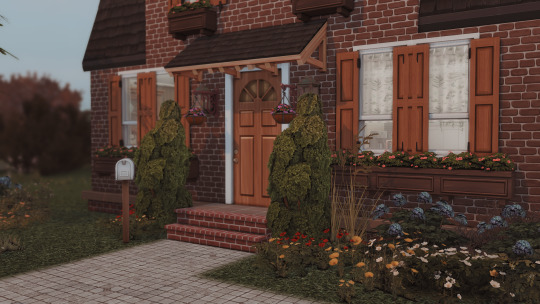






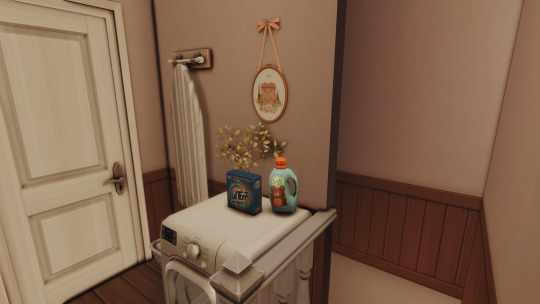

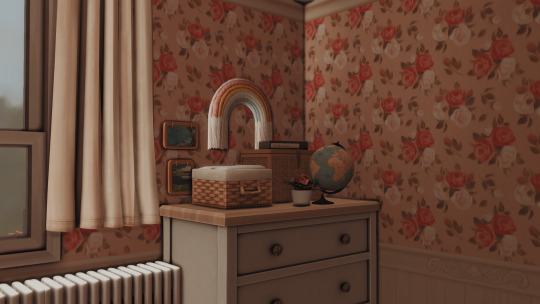
Dutch Colonial Inspired by @micsso
I have been staying in the Netherlands for a long while and I felt inspired to try and replicate some of the houses I see here. This will also be my current sim's childhood house so I tried to give it a cosy and homie feeling to it! Feel free to tag me if you use it, I would love to see it c:
Message me for a link to download the cc.
Recommended Downloads: Moriel's Plant Replacements
💌 Gallery ID: something_mia | Download link
@maxismatchccworld @ts4cc-finds @mmfinds
#Dutch Colonial Inspired#micsso#sims 4#simblr#s#ts4#s4 screenshots#the sims#s4#ts4 horse ranch#horse ranch#s4 build#ts4 build#sims 4 build#ts4cc#s4cc#s4 download#download#ts4 download
50 notes
·
View notes
Text
all the time, gotta walk away, for a moment, take a break, infuriated, when reading about European implementation of forced labour in plantations (especially in the nineteenth and early twentieth centuries, whether it's sugarcane or rubber or tea or banana, whether it's British plantations in Assam or Malaya; Belgian plantations in Congo; French plantations in West Africa; Dutch plantations in Java; United States-controlled plantations in Haiti or Guatemala or Cuba or Colombia). and the story is always: "and then the government tried to find a way to reimpose slavery under a different name. and then the government destroyed vast regions of forest for monoculture plantations. and then the government forced thousands to become homeless and then criminalized poverty to force people into plantation work or prison labor." like the plantation industries are central (entangled with every commodity and every infrastructure project) and their directors are influencing each other despite spatial distance between London and the Caribbean and the Philippines.
and so the same few dozen administrators and companies and institutions keep making appearances everywhere, like they have outsized influence in history. like they are important nodes in a network. and they all cite each other, and write letters to each other, and send plant collection gifts to each other, and attend each other's lectures, and inspire other companies and colonial powers to adapt their policies/techniques. not to over-simplify, but sometimes it's like the same prominent people, and a few key well-placed connections and enablers in research institutions or infrastructure companies. they're prison wardens and lietuenant governors and medical doctors and engineers and military commanders and botanists and bankers, and they all co-ordinate these multi-faceted plans to dispossess the locals, build the roads, occupy the local government, co-erce the labour, tend the plants, ship the products.
so you'll be reading the story of like a decade in British Singapore and you're like "oh, i bet that one ambitious British surgeon who is into 'economics' and is obsessed with tigers and has the big nutmeg garden in his backyard is gonna show up again" and sure enough he does. but also sometimes you're reading about another situation halfway across the planet and then they surprise you (because so many of them are wealthy and influential and friends with each other) and it'll be like "oh you're reading about a British officer displacing local people to construct a new building in Nigeria? surprise cameo! he just got a letter from the dude at the university back in London or the agriculturalist in Jamaica or the urban planner from Bombay, they all went to school together and they're also all investors in the same rubber plantation in Malaya". so you'll see repeated references to the same names like "the British governor of Bengal" or "[a financial institution or bank from Paris or New York City]" or "[a specific colonial doctor/laboratory that does unethical experiments or eugenics stuff]" or "lead tropical agriculture adviser to [major corporation]" or "the United Fruit Company" and it's like "not you again"

324 notes
·
View notes
Note
I know you used to have a book wishlist, where did that go?
Yes I did, it was gently retired, though we had some very generous people who sent me books (THANK YOU <3 I continue to be shocked and warmed by this community's generosity) I found that I am much more of an audiobook person. I have trouble keeping information in my mind if I am reading it physically. That being said, I have also begun requesting books from my local library, which has been a massive resource that has assisted me more than I could have imagined before I started using it.
That being said, there are some books that I wish I had access to still, just because they don't have audiobooks. Currently my list is made up of:
Feeling Backward: Loss and the Politics of Queer History by Heather Love: "Feeling Backward" makes an effort to value aspects of historical gay experience that now threaten to disappear, branded as embarrassing evidence of the bad old days before Stonewall. It looks at early-twentieth-century queer novels often dismissed as "too depressing" and asks how we might value and reclaim the dark feelings that they represent. Heather Love argues that instead of moving on, we need to look backward and consider how this history continues to affect us in the present.
Prairie Fairies: A History of Queer Communities and People in Western Canada, 1930-1985 by Valerie Korinek: Prairie Fairies draws upon a wealth of oral, archival, and cultural histories to recover the experiences of queer urban and rural people in the prairies. Focusing on five major urban centres, Winnipeg, Saskatoon, Regina, Edmonton, and Calgary, Prairie Fairies explores the regional experiences and activism of queer men and women by looking at the community centres, newsletters, magazines, and organizations that they created from 1930 to 1985.
Racism and the Making of Gay Rights: A Sexologist, His Student, and the Empire of Queer Love by Laurie Marhoefer: Racism and the Making of Gay Rights shows how Hirschfeld laid the groundwork for modern gay rights, and how he did so by borrowing from a disturbing set of racist, imperial, and eugenic ideas. Yet on his journey with Li, Hirschfeld also had inspiring moments - including when he formulated gay rights as a broad, anti-colonial struggle and as a movement that could be linked to Jewish emancipation. Following Hirschfeld and Li in their travels through the American, Dutch, and British empires, from Manila to Tel Aviv to having tea with Langston Hughes in New York City, and then into exile in Hitler's Europe, Laurie Marhoefer provides a vivid portrait of queer lives in the 1930s and of the turbulent, often-forgotten first chapter of gay rights.
If you wanted to fund my ability to get my queer hands on these books, here is the link:
#dont feel pressured to pay#and know any and all donations are split#so not all of it is going directly into my book fund lol#answered
155 notes
·
View notes
Text
Iwagakure Worldbuilding Headcanon
yes, it is time. i have been planning to do this ever since i wrote the suna ones. what inspired me to write these? my chem analytics lab practical
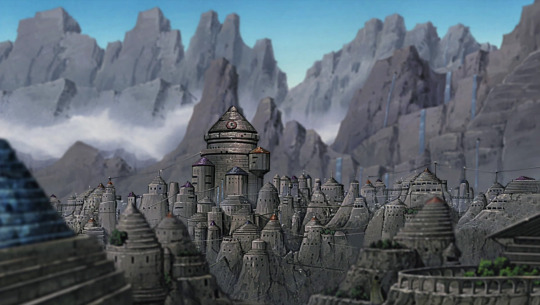
People and Culture
Iwagakure is a rather densely populated village, with its country having a rather large population. The citizens of Iwa are often times brutally honest with each other and often work as one big union. The language spoken in Iwagakure sounds similar to Konoha's language, but not quite (Almost like Dutch sounds compared to German). There are many different dialects across different valleys, every one sounding slightly different from the other. This sometimes leads to interesting dialoagues, but they manage. Many foreigners think Iwa citizens don't have a sense of humor, but they do. It's just that it's rather dry compared to what most foreigners are used to.
Infrastructure
A lot of the infrastructure in Iwagakure is made of stone and their architecture is very immaculate and they like using earth style to accentuate their homes. Despite their economy not being the strongest, Iwagakure has a homeless rate of 0% since housing is easy to construct there.
Education
In the Iwa academy, genin are not only taught ninja skills, but basic geology and chemistry as well. Despite Iwa nin being regarded as 'stupid' by outsiders due to their funny accents, they have an extensive education system.
Fireworks
Fireworks in Iwagakure are a special good, and they are very proud of the fact that they invented it. No one really knows how, but the story says that one shinobi of Iwagakure's explosion corps added copper sulphate, rubidium acetate, strontiom sulphate and lithium chloride into their explosive clay, creating a prototype of the fireworks they use nowadays. Using their knowledge of the different minerals and their flame test colors, the earth country's pyrotechnicians are able to create elaborate artworks out of thin scraps.
Clothes
Most clothes are dyed with either natural colorants or colorful chemicals. Most older people prefer the natural dyes from plants, such as ube, purple and orange carrots, etc. The youngsters are more adventurous.
Politics
Much like Suna shinobi, Iwa ninjas had more trust in their tsuchikage than in their own daimyo, however this recently changed due to Oonoki, the third tsuchi-kage hiring mercenaries like the Akatsuki to work behind the other big villages backs. Since the economy of Iwagakure was not the strongest, they often relied on imperialism as well as colonialism to build their economy. In the modern era, this has changed, however, since Iwa and the Earth country in general is the biggest exporter of rare minerals such as, diamonds, pottery, glassware and fireworks.
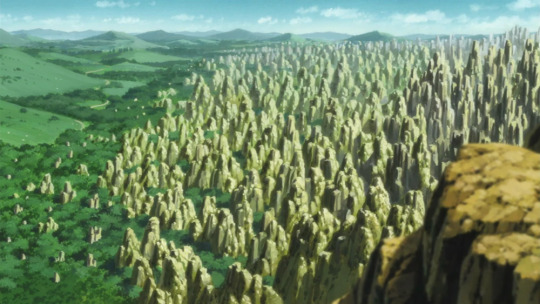
Flora
The Earth country is a cold and rocky place, with many gushes of wind carrying rock and debris throughout the country, even beyond its borders. The winters of Iwagakure are very cold and harsh and the summers are only mild compared to the fire country, where Konoha is located. There is little to no vegetation, and the vegetation that exists is used for agriculture which has led to many native animals being driven out of their natural habitat.
Fauna
The mountains of Iwagakure are populated by ewes, goats and sheep, which, much like in our world, could not care less about gravity. Another animal that can be found in such large heights is the snow leopard, a symbol of bravery and strength to Iwagakure shinobi. Wolves are also native to Iwagakure, however its citizens have an ambiguous relationship to the canines, as they frequently pillage livestock from the people. It would also be a crime to not mention yaks, the national animal of Iwagakure. Their meat, tar and fur are all highly prized and yak meat serves as a protein source to many Iwa shinobi. When looking up into the sky, eagles, kites, vultures and hawks are no rarity, feasting on any small mammal they might find. Fortunately for all arachno- and insectophobes, Iwagakure's insect and spider population is rather small, the only ones that survive living in such high altitudes either minding their own business or even being useful to its citizens, the iwagakure mountain bees, coming to mind.

Food
Tubers and Root vegetables
The main component of any Iwagakure dish are tubers and root vegetables. Iwa nin actually prefer them over grains as their main source of carbohydrates. The most popular ones are potatoes, purple carrots, parsnips and onions. Often times, ube and ube extract is used as a flavoring agent and colorant for food.
Legumes
Another important stable of Iwa cuisine are beans, which are imported from Sunagakure. The most popular variety are kidney beans, mainly due to their color matching the iwagakure shinobi uniform. In the past there used to be many lectin and cyanide poisonings, until the government stepped in and implemented 'how to properly cook beans' into the education system.
Meat
Most meat comes from either yaks, goats, dear or sheep. Unlike their close allies, Sunagakure, Iwa nin rarely dry their meat and prefer it marinated or jarred.
Sweets
Similarly to Kirigakure, not many manufactured sweets can be found here, however, crispy rice cakes (Iwagakure rock mochi) are a specialty. The most popular filling for these rice cakes is, of course, red bean paste.
#naruto#naruto shippuden#naruto headcanons#naruto imagines#naruto scenarios#naruto fanfiction#akatsuki#headcanons#fanfiction#deidara headcanons#deidara#iwagakure#iwa#naruto worldbuilding#worldbuilding
78 notes
·
View notes
Note
Hey! I'm back! I'm mostly hoping for a direction to be pointed in, because I don't actually know where to start. So I've got my very large world that I'm working in, and a few plotlines are looking like they're going to have professional mages in Europe during WWI / WWII. While I'm not super interested in dedicating entire novels of story to answering the question of "and how does magic change this" because honestly, the answer goes in the range from "secret mages change ultimately very little about the results, but there was magical fighting there too probably" to "it never happened thanks to magical intervention and now I need to figure out how the modern day is different without two very major historical events".
That being said, I'm likely to at least have to give a broad-strokes answer to it. I don't have much knowledge about WWI/II, since it's never been a period of history I've been interested in studying - I'm vaguely aware of the broad strokes of the Holocaust and also Canada's involvement, since that made it into highschool education several years ago. So I've got some serious knowledge gaps I'd have to fill. But if I do have to sit down and figure out how magic would change things, where should I be looking for examples / inspiration?
(I haven't answered the question yet on if mages were well-known to most non-magical societies at the time, and if so to what extent. I know that'll majorly affect what I can do, but not exactly how or in what ways. ^^; )
There's a lot to unpack here, so let's start with one of the most basic parts. The first and second world wars were extremely different conflicts. Technology, strategies, and attitudes towards war were completely different between them. You can't, really, transplant events from one to the other without dealing with serious thematic shifts.
Beyond this, there's a some real world mysticism associated with both conflicts. The first World War came in at a time when then the Spiritualist movement was gaining traction. If you're unfamiliar with this, it's probably simplest to describe this as a new age religious movement that mostly died out in the early 20th century. To the best of my knowledge, this never really penetrated into decision making regarding the war, but it was an element of, “life back home,” during the war.
The second world war is a lot better documented in this regard. The upper echelons of the Nazi party were particularly interested in creating a, “mythical basis,” for their ideology. This included forays into pseudoscience, faked archaeology and anthropology, and outright mysticism. There's a very real, historical, reason why you'll frequently see Nazis tied to the supernatural, and it has a historical basis.
Unsurprisingly, some of the German Spiritualist societies directly transitioned into the Nazi party, either directly or by supporting them. So, there is some continuity between these points. If you want a slightly more extensive primer on this, Wikipedia does have a pretty decent article on the actual history (including how it is frequently over-represented in popular fiction.)
Now, if you want to know what the world would look like without the first world war, I don't know. As in, that changed so much more than you realize. Don't even take this as a complete list, because I'm scratching across the surface from memory.
The first world war changed Europe's attitude towards military conflict irrevocably. Prior to this, European powers had viewed war as almost a diversion. Military hardware had been advancing rapidly in the late 19thcentury, but outside of a few border skirmishes between African colonies (I think it between was the Dutch and British), there hadn't been any serious armed European conflicts in over a century. Even early military officers who realized the destructive potential of machine guns were frequently punished and disregarded when they warned their superiors of what these new weapons were capable of. Before the outbreak of war, the expectation was that the first World War would be fought similar to how the Napoleonic campaigns had played out. Obviously that didn't happen, and by the end of the war over twenty million had died, with another twenty-one million wounded.
World War II was a direct consequence of the first World War. Germany was forced to sign crushing reparations in 1919 with the Treaty of Versailles. This started the resentment, and anger, that the Nazis exploited in their rise to political power over the next two decades. Again, the interwar period is something you want to look at in more detail.
The First World War created the Soviet Union. Specifically, the Russian Revolution of 1917 was a direct consequence of the Imperial Russian mobilization against the Axis powers. There were more factors, but if Archduke Franz Ferdinand didn't soak a bullet in in 1914 Sarajevo, there would have been no Soviet Union.
If there's no Soviet Union, there's no Cold War. If there's no Treaty of Versailles, there's no Nazi Germany.
And we're not even done.
Woodrow Wilson's speech on Self Determinism to (if I remember correctly) the League of Nations gave a lot of smaller nations the belief that the 20th century would be characterized by greater respect and autonomy to them. (It's seriously a very hopeful speech.) For many colonized powers, they were under the impression that this meant they would granted independence (or at least, granted dignity) under the new world order that was being ushered in. This included powers like Algeria and Vietnam who were under French Colonial control. (This will come up again later.)
It's easy to remember the Germans. Germany was one of the Axis powers in WWI, and of course, again, in WWII. Do you remember the other major Axis powers in WWI? Because most of them don't exist today. The Austro-Hungarian and Ottoman Empires were carved up between the Allies as spoils of war. This directly lead to the creation of the Balkans, and of course the conflicts there in the 90s. But, it created the modern Middle East.
Similarly, the French and British laid claims to swaths of the Middle East (which were previously part of the Ottoman Empire), with little regard for the indigenous ethnic groups. Setting the modern borders for Iraq, Iran, Syria, Turkey (and I'm probably forgetting a few more.) Also creating problems (like the instillation of the Pahlavi Dynasty in Iran, which set the stage for the modern, Theocratic State, after the 1979 Iranian revolution.) Again, without the first World War, and specifically without the Treaty of Versailles, modern Iran would be unrecognizable, as it was part of a major Eurasian power. Similarly, without the Treaty of Versailles, there would have been no Iran Iraq wars, and probably none of the Iraq wars as we recognize them today.
The carving of the Austro-Hungarian and Ottoman Empires also created a bit of resentment from Russia. Russia formally withdrew from the war after the 1917 revolution. As a result, they were completely cut out of reparations. So, while France and Britain were carving up the Middle East and helping themselves to Germany's economy the Russians were told to kick rocks. Historically (going back to the middle ages) Russia struggled to shake a reputation of being the, “backwoods,” of Europe. Technologically, socially, and economically, they struggled to keep up with European advancement. Some of this simply comes down to the distances, the harshness of their climate, and the difficulty of effectively governing such a massive nation. It's not an indictment of the Russian people. However, in the aftermath of WWI, the newly founded Soviet Union found itself in a particularly rough situation. They suffered heavier casualties than any other allied power (coming in second behind Germany for overall dead throughout the war.) (For reference, the Russian military mobilized more troops than any other power in WWI, their casualties were in line with other allied nations.) This was part of the political atmosphere that lead to the revolution, but it also meant that their exclusion from the Versailles reparations was particularly stinging. When I said that without WWI, there would be no cold war, it's not just because the Soviet Union wouldn't exist. Imperial Russia was an ally of the British.
If this wasn't bad enough, the Russian Revolution of 1917 also resulted in a six year civil war, in which Allied powers intervened on the side of the Czarists.
As a quick aside, Allied powers and Axis are the WWII terms. Technically, if you want to be precise, the contemporary terms were Entente Powers, with the UK, France, Italy, Russia, and so on, with the Central Powers referring to the Austro-Hungarian Empire, The Ottoman Empire (also sometimes referred to as Turkey at this point), and Germany. It's also a little like referring it to World War I. No one in 1919 would have referred to the conflict as, “The First World War,” or, “World War One.” No one was expecting a sequel to get pumped out less than twenty years later. The contemporary term was, “The Great War,” or, sometimes, “The War to End All Wars,” which was unfortunately too optimistic.
In a quick admission, mea culpa, I can't remember exactly how the First World war affected China. There was continuity between the Treaty of Versailles and the rise of the PRC, but I don't remember the exact cause and effect beyond Mao's trips to Moscow.
In the case of Vietnam (at the time, referred to in Europe as, “French Indochina,”) Wilson's speech on Self Determinism, followed by the deliberate exclusion of minor powers and colonized (or, if you prefer, subjugated) nations from the Treaty of Versailles sent some very mixed messages. In particular, Ho Chi Minh was actually in Paris during the negotiations, with the intention of representing Vietnamese interests. (There are a few stories like this, though I can't remember the full roster.) Though, somewhat obviously, the French were not interested in recognizing one of their colonies as an independent state. It's a little more reductive to say that, “without WWI there would have been no Vietnamese war. Vietnam has a strong history of throwing off foreign, occupying, powers. They expelled the Chinese multiple times, they stopped the Imperial Japanese ground campaign during WWII, they threw out the French and then did the same with the United States. Most of those are events that would not have happened if WWI didn't occur, but expelling foreign powers is part of their cultural identity. In this specific case, it's worth knowing that US involvement in Vietnam came at the behest of the French, invoking a now debunked political concept called, “The Domino Theory.” The fear was that a Communist Vietnam would (through simply existing) inspire communist revolutions in adjacent countries, and policy makers at the time feared that failing to contain the spread of communism from China to Vietnam would see a, “domino effect,” of revolutions producing Soviet friendly states across the entirety of southern Asia, from Indonesia, across India, before reaching Iran. Typing this almost 75 years later it seems laughable, but that was the political calculus of the day.
In the case of US politics, the 19thcentury, and even into the early 20thcentury, the US maintained a somewhat isolationist stance. Wilson struggled to get the US involved in WWI, and the Senate only declared war in 1917 (three years after the war had started.) After the war, the US withdrew back into a mostly isolationist stance. The biggest event in the 20thcentury that affected US foreign policy was the Japanese attack on December 7th1941. That single moment gave Roosevelt the “political capitol,” to completely redirect American foreign policy, and lead to the much more internationally aggressive America that we see today.
If you're expecting me to, once again, say, “this wouldn't have happened without WWI,” in this case, I'm not sure. Imperial Japan's campaign in the Pacific is part of WWII, but it's one of the very rare pieces where the instigating events (and, even some of their military campaigns) predate WWI. Japan had already won a skirmishing war against Russia in 1904 and 1905. Imperial Japan had annexed Korea in 1910. In 1931 they invaded Manchuria, and by '37 had nominal control over the province. Even in the absence of WWI, Japan's military ambitions were seriously ramping up.
So, in the simple question of, “how much did these events affect?” A lot. And, I'm going to stress, aside from looking up dates, this is all off the top of my head. There is a lot of fallout from one nineteen year-old Serbian Anarchist with a pistol.
If you just want a historical breakdown of the events of World War I, in excruciating detail, I'd suggest The Great War on YouTube. From 2014 to 2019 they did a weekly ~10 minute news video covering the events 100 years earlier. So, if you want a detailed chronology, this is probably the place to start.
So, the thing I don't quite get when you're talking about the mage conflict not mattering might just be a communication issue. This isn't really an indictment of you, but you may want to reconsider any pitch that runs along the lines of, “my characters don't do much to affect the world.”
What you're probably looking for is a fairly reasonable, “secret war,” structure, where your characters are confronting an unconventional threat that runs in parallel to the rest of the war. This is your normal, “save the world,” plot. While these can be a bit cliché, they are pretty easy to write. The stakes are easy to grasp and articulate. It's not incredibly creative, but it is effective. Really the biggest danger with this structure is simply audience fatigue.
If you intend to expand the story into a series, you've already put the biggest threat you can on the table. Doing that again can feel repetitive, and stepping back from that into smaller threats can easily disappoint the audience. The problem with escalation is “the line goes up,” and once you've threatened to destroy the world, you can't really get the same results from doing that again.
You can build a series around dismantling a plot to destroy the world a piece at a time, though if that's your goal, you might want to start smaller and build your way up. While it's not the only option, one structure for serialized meta-stories like this would be to start with some independent, small-scale stories. As you progress your characters might realize that they're dealing with a greater threat, so the natural progression is for them to start trying to gather information about the foe who is orchestrating the threats they're seeing. This can include trying to determine what their foe is doing, and a lot of minor stalling actions, where they try to deny their foe various necessary resources. (This could include eliminating individuals supporting their enemy, it could include capturing or destroying artifact MacGuffins.)
As your characters discover more about their foe, and cause more problems, they're going to come under more direct retaliation. This could be simple situations where your characters are being literally hunted. Or a character who's operating undercover might be exposed and captured. Alternately, a cunning foe might try to implicate members of your characters as double agents, they might assassinate secondary characters who are helping your heroes. If they have the authority, they may even order conventional military forces to pressure your characters.
As a quick aside, it can be very easy to find yourself writing heroes who primarily focus on maintaining the status quo. Even the basic, “save the world,” concept is rooted in the idea that you don't want to see the world changed into something unrecognizable. When you have your characters on offense like I'm suggesting, it can do wonders for making them feel like they have actual agency, and and less like passive participants in your story. Similarly, a villain who retaliates based on your heroes actions can feel like an active participant in the story, even if they have yet to appear on the page. It can be very threatening to have your characters facing off against an enemy they can't even identify.
Ultimately, this structure would tend towards a situation where your characters (or at least your surviving characters) would be able to assemble a plan to finally eliminate their foe. As a general rule, for tension, you want your characters to assemble the best plan they can with the information they have, however, the more risky it is (especially when those risks are unavoidable), the more tense the situation will be. If you're willing, this would be the time to start killing characters without warning. Forcing the survivors to adjust the plan on the fly, and quickly find replacements when characters with critical skills are suddenly gone. (In general, the shock value of killing main characters has severely diminishing returns, however, this is a genre element for commando stories, and that's basically what you're looking at here.) Structurally, most of your characters have played their parts by now, and the series is ending once the mission is over, so you won't need those characters for something later. All that is left is to finish it go home, or (if you really want to twist the knife), scratch off the last characters and close the story.
I suppose, another approach would be to argue that the fantasy elements are ultimately a meaningless attempt to avoid the horrors of war, that your mages have no meaningful effect on the outcome of events because they're effectively LARPing in a warzone. It's unpalatable, brutal, and thematically perfect when looking at World War I. And there is some historical truth to this. A number of mystics and self-proclaimed mages tried to influence the outcome of both world wars to no effect. There is room for scathing indictment of fantasy as a genre when intersects with the entirely real horror of the war. Somewhere between Tolkien and Aleister Crowley, there is usable material to light up both both of them. Now, having said that, this would not be easy to write. You'd basically be working with the magical realism genre, though I don't think I've ever seen it used quite this viciously. If you really want to set the world on fire and walk way, this would be an option.
The obvious place on where to start your research would be with history books. Again, The Great War has that very detailed chronology and from what little I've seen, they've been branching out into other topics, including a few things I mentioned in passing.
For World War II, I'm not sure what I'd hold up as a definitive primer. Wikipedia is not a terrible starting point on this reference. In the case of World War II there was an entire cottage industry of documentary production companies that focused on World War II content back in the mid-to-late-90s. There are probably tens of thousands of hours of documentaries on the subject. Including a lot of very specialized documentaries. You can find full multi-part series on the historical context Nazis and the occult. I don't have any references on hand, but, I've run across more than one over the years.
-Starke
This blog is supported through Patreon. Patrons get access to new posts three days early, and direct access to us through Discord. If you're already a Patron, thank you. If you’d like to support us, please consider becoming a Patron.
#howtofightwrite#Starke answers#writing advice#writing reference#writing tips#writing historical fantasy
104 notes
·
View notes
Text
And, dear York, you would fall, and turn the white snow red as strawberries~
Ships: None!
Warnings: getting shot, inaccurately described historical events (the Boston Massacre), and the way that my age sh*t works is a little wonky (lets just say that NY is maybe a teenager here?).
Genre: Hurt/Comfort I guess-
Title is inspired by: “White Winter Hymnal” by the Fleet Foxes.
—————————
March 5th, 1770
Massachusetts gently held New York’s hand as the walked along the Boston Harbor, and New happily walked next to him, lost in his own little world. Mass chuckled fondly but quietly at the child like wonder in NY’s eyes as the slightly taller colony looked out onto the ocean. After a few more minutes of walking, the two colonies decided to take a break, and each took a seat on the edge of the harbor, their legs hanging over the side. He yet again chuckled at the childish wonder in NY’s eyes along with the slight spark that he had thought was long gone.
"Like what ya see Yorkie?" Mass teased, smirking when NY jumped a tiny bit.
"H-huh? Oh- uh- yeah it’s pretty I guess." NY said before turning back to look at the vast ocean. Mass couldn’t help but frown slightly at the faint-but-still-visible bruise on NY’s cheek from England.
The two just sat there in silence for a little bit lost in their own thoughts, until Massachusetts heard a small giggle from his little brother. He turned to York with a small smirk.
"What’s so funny Yo-" Mass was cut off by a splash of water hitting him directly in the face. He spluttered a little as he tried to regain his composure. He opened his eyes and smiled evilly at New York, who chuckled nervously. “Oh you little sh*t!-"
Massachusetts splashed a bit of water at New York before tackling, pinning and tickling him. He smiled when his little brother’s laughter filled the air, and he eventually stopped, gently rubbing the feeling off York’s torso. He ruffled the taller’s hair and grinned "That’s whatcha get for messin’ wit’ me Yorkie!~”
"Yeah yeah whateva’…." NY said, curling up next to his big brother.
“Hey Matthew!! Cmere!"
Massachusetts turned around at hearing the use of his human name. "Ey Yorkie I’m bein’ called i think. Ya wanna come wit’ me or do ya wanna stay here?”
"I’ll stay here." NY said, though he was obviously too busy playing with a seagull that had come to say hello.
Mass snorted a bit. "Okay then. By the way, those things bite. Just sayin’." he said before walking off in the direction he heard his name be called from.
—————————
[half an hour later]
NY had been busy playing with a seagull and a crow that resided at the Boston Harbor, and had ever so fondly given them the names Kraai (the Dutch word for crow), and Zee (short the Dutch word: Zeemeeuw, which means seagull). Animals, especially birds and cats, had always brought him a weird amount of happiness. One that he rarely ever got nowadays. He chuckled a little when Kraai jumped on his shoulder and squawked. York did his best to mimic the sound, but it sounded more like an angry cat. Kraai gave him a gentle wack with her wing and squawked at him, sounding a lot like a mother lecturing a child.
"Okay okay I know, I know that was terrible…." NY said with a small chuckle. A sudden gunshot pierced the air, making the young colony flinch. He got up and started running to where he heard the gunshot, in case of Massachusetts being hurt. That would be bad….. Zee and Kraai followed him, flying high in the air.
He got to the city square and hid behind a building, peaking his head out. What he saw was utter chaos. There were people, mainly colonists, all running around in a frenzy as about……nine??? soldiers shot at them. NY frantically looked through the crowd, trying to find his big brother. He eventually caught sight of him and sighed exasperatedly when he saw Massachusetts with a chaotic grin on his face. He jumped a tiny bit when a body dropped behind him.
"Mass!!" He shouted, desperately trying to get the older’s attention.
Massachusetts turned his head at the sound of his name, and the grin quickly faded when he saw his little brother, who was standing in the middle of it all. Sh*t sh*t sh*t he never meant for York to be a part of this! Fun was over, Operation: Get NY out here had begun.
"York?? What’re you doin’ ere’?! Are ya crazy?!?!" He yelled, running over to New York, who looked kinda scared.
"I could be askin’ you the same damn question dumbass!!” York shouted, covering his ears a little. He had never liked loud noises.
"Get outta ere’!! Are you tryin’ to get shot?!?" Mass shouted, hugging the taller colony close.
"I came ere’ lookin’ for you!! I was worried that you had gotten shot dumbass!!" New York responded, burying his face in Mass’s hair.
Mass’s face softened slightly at that as he started to escort York and himself out of the city square. Suddenly, New York threw himself in front of Massachusetts, and in turn the soon-to-be Bay State’s face paled a ghostly white as he looked down in front of him. New York was curled up gasping slightly and coughing in pain as he clutched his stomach. Mass didn’t even have to be told anything to know that NY had been shot. Especially when he saw the snow beneath them be died as red as strawberries in the summer time. DAMMIT.
He quickly picked up NY and ran behind a building, muttering an apology when he heard a whimper and yelp from the younger. Mass waited till he was sure that there were no witnesses to teleport into a clearing in the woods. He gently laid his injured brother on the ground and wrapped his jacket around the wound to try and stop the bleeding, and then closed his eyes to try and summon one of the other colonies to help. Dammit. It wouldn’t work. He was too stressed to focus. God NY’s breathing had slowed down a lot….. Wait- why wasn’t NY moving anymore?? Mass checked his pulse, and sighed in mild relief when he felt a pulse. He took off NY’s coat and pressed it against the wound, wincing when NY gasped in pain and coughed, blood spluttering on his lips. Mass cried quietly and hugged his brother close, fully convinced that this would be his brother’s next painful death. That was, until, he heard the caw of a crow above him.
Massachusetts looked up to see Kraai flying above them, and was about to swat her away until he noticed that Kraai seemed to be releasing worried-sounding coos and nudging at NY’s arm with her wing. God he couldn’t believe what he was about to do…..
"Hey uh-" Damn. Is he really talking to a bird right now? "Can ya- umm…. I doubt that you can understand me….. but if you can, NY is hurt and he needs help, can you go get help?" Mass was really hoping that this worked, even if it was ridiculous that he was talking to a bird.
Kraai tilted her head a bit before doing her best to do what somewhat resembled a nod and flying away. It worked! It actually worked! Holy sh*t! Mass could cry tears of joy and he nearly did. He hugged his little brother close, whispering reassuring words into his ears.
"Everything’s gonna be alright…..helps on the way….."
—————————
My fellow NY simps: @stawpny @misery-has-no-company-now @alaskashigh @kyledoesstuff-09 <3
And you cuz yes: @jazzyfrog <333
We love Kraai (the crow) and Zee (the seagull) here (they are original characters maybe-)
#welcome to the table#welcome to the statehouse#ben brainard#wttt#wttsh#wttt new york#wttsh new york#wttt massachusetts#wttsh massachusetts
27 notes
·
View notes
Note
Does your Pinterest board have any inspo for the Munson home(s)? I'm a ho for interior design.
I do! I pretty much have a board for everything, just ask lol 😅😅😅 I’m almost considering a Old Haunts Discord just to have a general archive of everything that’s accessible to whoever’s interested.
Oh, same, total ho for interior and exterior design. These aren’t all 100% my visions, but they help give a general idea:
Chicago apartment concepts:
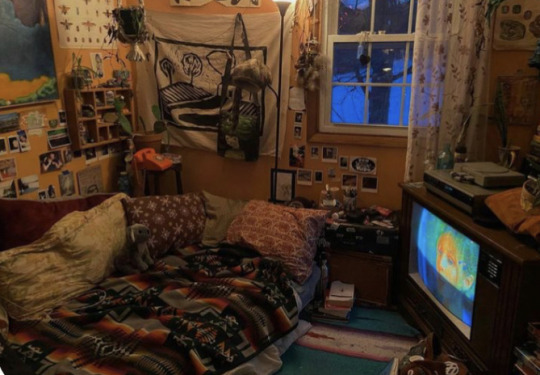



Some NYC apartment concepts (the hardest for me to find what I’m looking for):



Inspiration for the Munson’s new house in the epilogue a New Salem Dutch colonial style:


#old haunts#old haunts ask#old haunts cinematic universe#hellcheer#eddie x chrissy#eddissy#munningham#chrissy x eddie#hellcheer fanfiction#hellcheer fanfic#anon ask
78 notes
·
View notes
Text


Puteri Indonesia DKI Jakarta 2 2023 Regional Costume: THE HEROISM OF BATAVIA SATRIA
This national costume is called The Heroism of Batavia Satria, inspired by the Legend of Jawara Betawi and Elang Bondol as Jakarta City Mascot. The Bondol Eagle is a rare species of animal that is limited to the Thousand Islands. Many legends have developed regarding the character of a champion or expert in playing silat in the Betawi people. A growing legend verbal in Betawi culture including about the actions of Si Pitung and Wa Item. The Pitung is the most popular icon of champion toughness in the Betawi community which is estimated to have lived in the 19th century in the Dutch colonial era. By lifting elements of Yellow, White and Gold that have their own meaning. Yellow means Idealism and Hope, White means Clean and Sacred and Gold meaning Prosperity, Victory and Prosperity.
Translated via google translate
49 notes
·
View notes
Text
Transitus Should Be Set In New England (Northeastern United States) - A List
By: A Midwestern American
It’s on my to-do list to spruce up the album’s wikipedia page and I’ll probably ask Arjen about location directly at some point for it. But for now, for fanfiction’s sake:
It is never explicitly stated where in the world the real-world portion of Transitus takes place. You can glean from basic context that it’s somewhere in the Global West but no real locations are stated by the lyrics, narration or liner notes.
I think the default is to assume it’s set in Great Britain, which is totally reasonable. Daniel’s family is consistently referred to as a “house,” hinting at noble status. The plot and setting are heavily inspired by that of Downton Abbey, right down to the uptown girl character dying horrifically and their racially discriminated servant spouse having a five-alarm crisis about it after the two were cut off financially from the uptown girl’s family.
That’s how I initially thought of it. Easy (not really), inconsequential Victorian setting.
But now, after a lot of research and writing and just sitting around and thinking about it, I have an alternate suggestion.
I think the story fits and would actually be more effective if it were set in New England, aka the farthest Northeast region of the United States. Specifically Connecticut but that’s not as relevant as it taking place in this region/country overall. I’ll go through the major arguments for this one by one, getting more plot-relevant as they go. Hopefully, given historical context and narrative themes, you’ll see my point here.
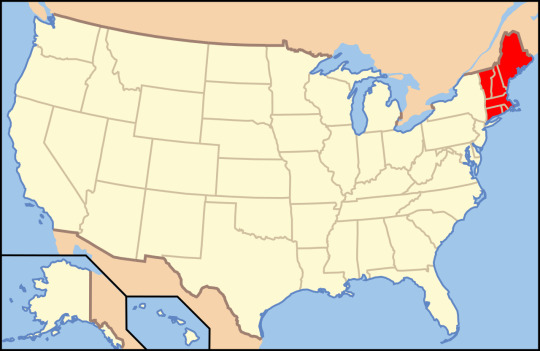
New England highlighted on a map of the U.S., comprising the states of Maine, Vermont, New Hampshire, Massachusetts, Connecticut and Rhode Island. The entire west side of the region borders New York State.
Enjoy. 🔥🇺🇸
1. Nationalities of Main Cast


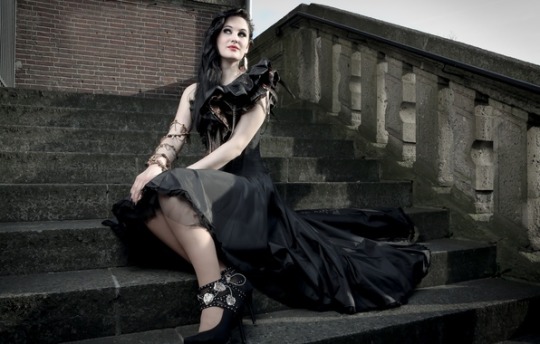

The weakest point, but worth mentioning. Three of the six human characters in Transitus, a majority and the most of any Ayreon album, are played by American singers: Amanda Somerville, Cammie Beverly, and Dee Snider. Dee Snider being the most notable because his character is this staunch, traditionalist patriarch guy who’s on Daniel’s back about the Old Ways, and from there I think it’s safe to assume this guy’s family has been in the spot they’re in for more than a few generations.
I personally really like integrating certain non-personality-related traits from irl singers into their characters, and I think nationality applies to that nicely in this context. 19th century New England aristocrats were usually one of two categories: generationally wealthy European wannabes that take an insane amount of pride in their colonial ancestry, or “self-made” business tycoons that made ungodly amounts of money during the Second Industrial Revolution.
More on that second category in a second, but given the very, very limited information we get on Dee’s character, he gives me more of that high-and-mighty old money vibe.
Also, with almost zero canon evidence: I am completely glued to the idea that The Soprano, played by a very Dutch Dianne van Giersbergen, is the ghost of Daniel and Henry’s mother. Like I will die on this hill. Coincidentally, Connecticut, a state I picked from New England almost entirely at random, was first colonized by Dutch settlers, setting it apart from a few other Northeast states. If we’re keeping with the Nationality of the Parent Characters Carrying Through From Real Life theme, then that would create a very strong tie between Daniel’s family and their home state, further emphasizing the father's prioritizing of retaining status and “proper breeding.”
2. Weirdly Specific Combo of Architectural Styles
I genuinely cannot think of any other place where these three buildings could possibly exist in close proximity to each other, like-
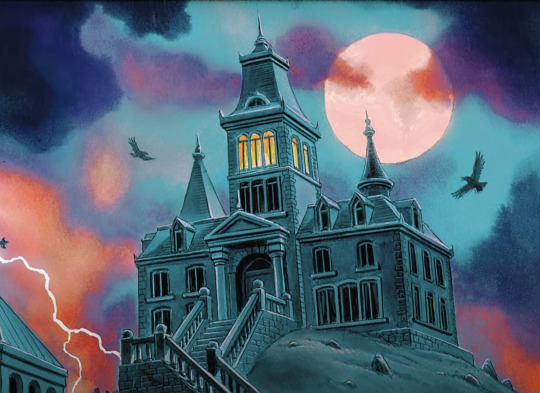
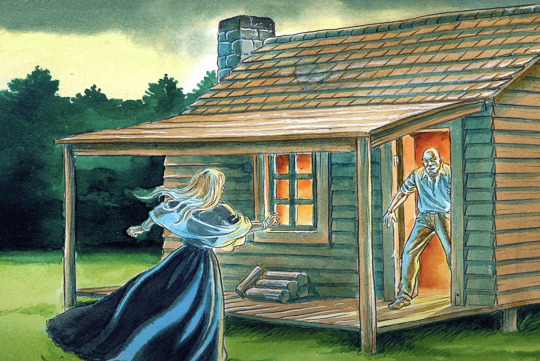
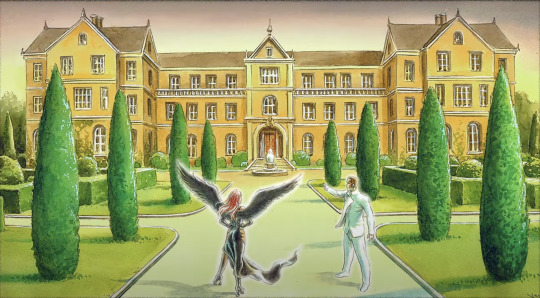
Daniel’s family’s house (bottom right) is by far the strongest visual argument you can make for Transitus being set in Britain, like that is an 18th century English manor house through and through. Fair enough, but:
The East Coast US is a bunch of former colonies that were under British rule in the Georgian period (1714-1837), hence the name “New England.” A lot of the architecture from that time is reflective of this, especially in the older Northern colonies. Southern ones tend to follow the Greek Revival/Neoclassical styles more.
I’d believe the Britain argument here if it wasn’t for the other two houses’ whole situation. Too much US-adjacent design present in this specific region for you to go “yea but the mansion, though” at the mansion that could also exist in said specific region.
As much as I don’t like this as a design choice in the comic: Abby’s parent’s house (bottom left) is a frontier log cabin. These became very, very common during Westward expansion, fueled by the Homestead Act in 1862, the Manifest Destiny Doctrine present throughout the 19th century, the California Gold Rush in 1848, etc… The style wasn’t exclusive to the West though, and a bunch are still standing in the rural East Coast.
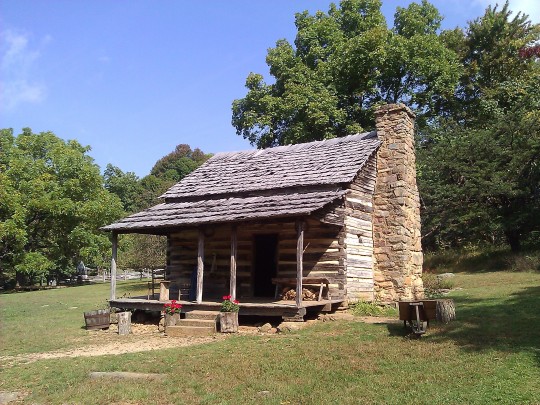
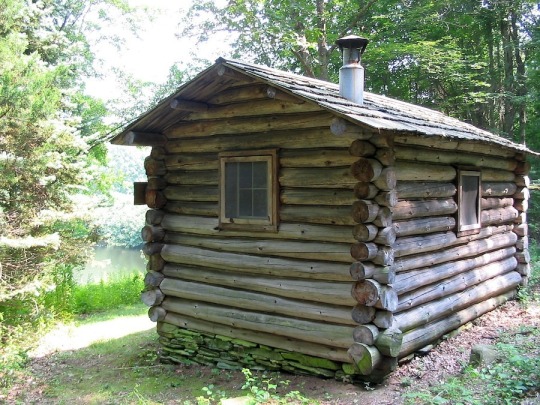
Cabins in Blue Ridge, Virginia and Hampton, Connecticut, respectively
As I said, I think it’s just a very odd choice. Among other reasons, the only part of this house that’s plot-essential is that it has a set of stairs for Lavinia to snap her neck on, and these things are pretty much always single floor structures.
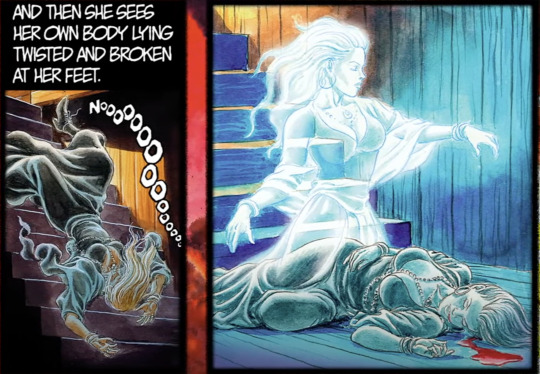
Girl, where do those even lead to???
I dunno. I just don't like it, even if it supports my point. It should have been a little two-story rowhouse. Moving on.
These houses existed outside the US. It’s a plain, utilitarian style that shows up all over the place in Europe, even if they’re more synonymous and symbolic to America.
The main house, though, Daniel and Abby’s, narrows it down a bit more. It really reminds me of the Second Empire style, popular in the Northeast and Midwest regions at the time.
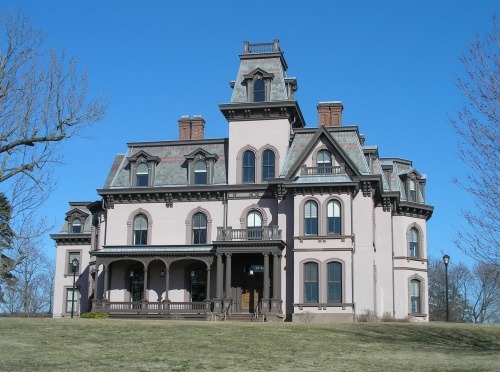
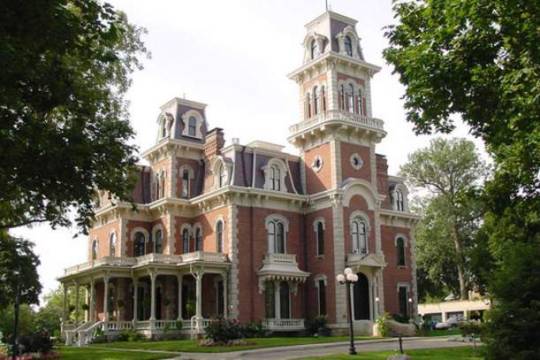
The John M. Davies house (Connecticut) and Terrace Hill (Iowa), both built in the mid-late 1860s.
Blocky base, mansard roof, giant statement piece (i.e. a tower) tacked on there somewhere.
The only issue with that guess is that it would make the house, at best, 25-30 years old. Second Empire was only a thing in the post-Civil War period, and the house is meant to be this ancient, haunted thing.
I had this idea for working around it a few months ago that it’s like…an older style that’s been updated in recent years? Say it’s originally a colonial era home (also plausible for New England) belonging to Daniel’s family. Makes sense, the base is still symmetrical and flat with two stories, steep roof, all that jazz.
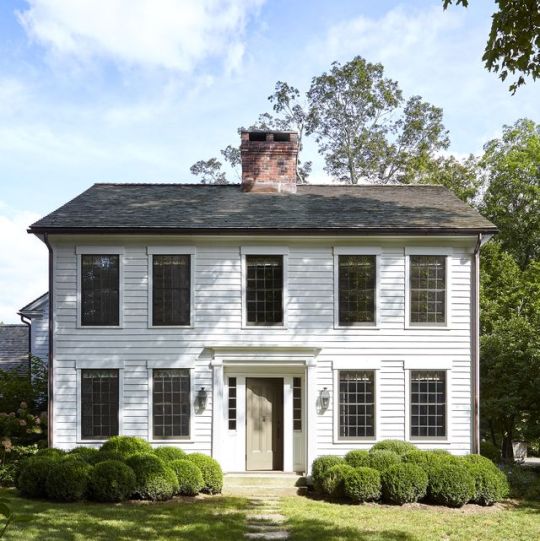
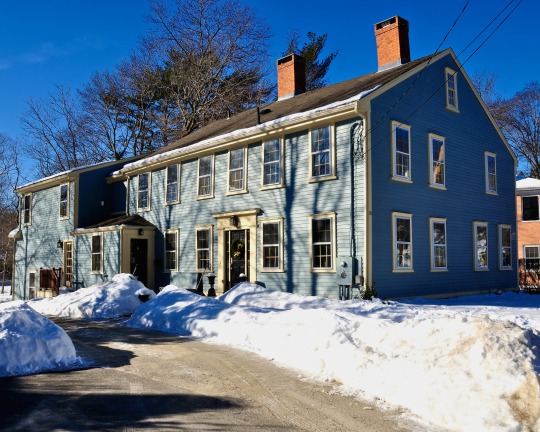
Washington, Connecticut (ca. 1750) and Hingham, Massachusetts (1721)
They clearly don’t use it themselves so maybe they rent it out? Maybe that’s part of where their money comes from; tenant properties and such. Maybe, understandably, nobody wants to pay to live in it because it’s old and run down and has a cemetery for a front yard, so they gut it and renovate, slapping some new age architecture over the top to make it more appealing.
It doesn’t work but the house finds a use eventually. It’s still old as hell, still American, plus you get the bonus representations of traditionalist vs progressive styles being combined, like the two people that live there.
...get it
Anyways, again: these all exist within sprinting distance of each other. I’d love some other suggestions but the Northeast is the only spot I know all three of them can comfortably exist in.
3. Historical Implications - The American Civil War (1861-1865)
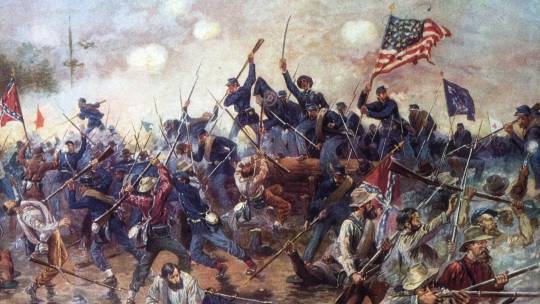
In January I finished this sort of…show bible for any and all Transitus HCs I had as an alternative to sending someone like 300 maxxed out rant-y text messages about it. Congratulations to @ay-miphae for somehow reading all of it.
Since it’s important to certain story elements, a section of the text is dedicated to a consolidated explanation of the American Civil War.
Kindly, a PDF of that section:
It’s deliberately written so someone with no prior knowledge of US history can follow it. That said, even if you are American and have the general gist of the war, I still think you should read it so you can really get where I’m coming from. It’s not something to be incorporated into a story lightly.
If you're not up for it, I at least think the intro paragraph speaks for itself in relation to my point:
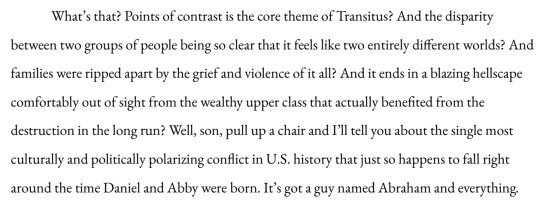
The war ended about 20 years before the album takes place and you’d be hard pressed to say it fits with its story’s themes, far beyond the surface level of its very real effect on American race relations (that were much more intense than those of England at the time):
The hypocrisy of the Union, as if the majority of the North wasn’t still segregated and racist as hell long after slavery was abolished.
The tension not just regarding race but socioeconomic class in the war years. Of particular interest was the fact that wealthy men could pay their way out of conscription, often viewing the war as a mere inconvenience rather than the system-altering mess that it was for everyone else.
Death. Just completely unprecedented amounts of it and unnecessarily so.
Your pick of the million and one ways it could have affected Daniel and Abby’s parents, and even Henry depending on how old you picture him.
Et cetera. You want a way to push the “Two Worlds” motif? Set the story in a Northern state two decades after a war fought over whether millions of people got to be treated like human beings or not, so impactful that the two sides of it are still so clearly, ridiculously discernible and will stay this way for another century and a half after.
As far as the possibility of setting Transitus in the South goes, fascinating as that could be, the plot of Act II makes it impossible. Interracial marriage was either void or outright criminalized in every single Southern state, until the ruling of Loving v. Virginia deemed the policies unconstitutional in 1967. There is no room for conflict over Abby receiving inheritance money - she and Daniel would have been straight-up arrested once Henry found out about them.
In the North, laws like this were repealed during or before the 1880s, if a state had them at all. In Connecticut’s case there were no laws ever prohibiting interracial marriage, but starting in the 1840s you were required to disclose your race in order to obtain a marriage license, which could create its own conflict with the risk of Daniel and Abby being exposed. Regardless of legal allowance, the practice was heavily frowned upon wherever you went, and the majority of them are recorded as being ordained in black churches, since white ones would turn them away and be well within their rights to.
A helpful reminder. 🔗
4. Main Setting - The American Gilded Age (1877-1900)
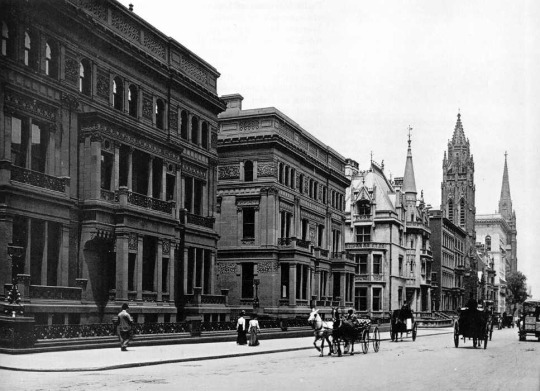
This was the point in my amateur "research" for this setting that I completely dug my heels in.
I mentioned the two sides of the 19th Century New England aristocracy - The dynastic, nobility-adjacent old money crowd, and the new money industrialists that rose to power during and after the Civil War.
Hey look, another (shorter) helpful PDF summary of a historical period:
Emphasis on "the wealthy elite using underhanded, exploitative practices to get what they want with no real consequences for it."
Henry fits...so perfectly into the category of these "robber barons" for me. Even if he's from a traditional, generationally wealthy family, he seems like enough of a greedy little cheat that he would force his way into this new crowd even if he didn't need to. It adds a few extra layers to a fairly archetypal 19th-century douchebag.
Henry being one of these Gilded Age industrialists sets him up as his family's main provider, allowing him to exert even more control over Daniel's life. Old money families had a severe distaste for these people, matching with Henry's extreme desperation to uphold his status. Even outside of higher social circles, these guys were hated by the general public and that was a 100% valid opinion. If Henry is this much more elevated above other characters in terms of wealth and the way he amassed it, it might make the insane jump from "jealous, nosy prick" to "murders an entire lower-class family for personal profit" a little more believable.
And, the most obvious point, the whole idea of this era, that "cartoonishly evil class divide" supporting the Two Worlds narrative.
The difference between Daniel and Abby's situations made all the more drastic, given that Henry may very well be one of (if not the) wealthiest men in the world in this prospective version of the story.
The nature of their wealth puts Henry, and by proximity Daniel, far more in the public eye than any British aristocrat would be. Daniel feels even more pressured and uncertain about his choices, even outside his family's expectations of him. Henry isn't just threatened by monetary loss after Daniel's death but cutthroat social humiliation, given who Daniel's inheritance is being released to.
Daniel is divided even further between his father's quiet, "safe" traditionalist lifestyle and his brother's much more forthright and totalitarian approach to everything. Maybe even tension created between Henry and his father for it.
Again, the stark difference between the post-War North and South, not exactly plot relevant but present in the setting.
The fact that the prosperity of Daniel's family is much more directly a result of the suppression of the poor and working class, the very difficult-to-navigate, set-in-stone power dynamic it creates in Daniel and Abby's relationship and how they come to terms with it.
And a little more on the Making-Shit-Up side: I have a troubling amount of extra characters I've used to fill plot holes that bother me, most of them servants, and trust me. The whole mass immigration aspect of this period makes character-building way more exciting. This is when the US Melting Pot idea really started, and it allows for a lot of different types of people to believably exist in a relatively limited setting. Christ, I even kept Abraham as an Englishman like his respective singer and it still makes sense within the world.
It's just...perfect. Arjen really picked the absolute perfect decade to set this story in for the sake of a throwaway 2084 joke.
5. The American Dream and the Tragic Fantasy of the Middle Class
This one is purely thematic, related to a more general national ideal than any one era or location (though I think the Gilded Age's presence boosts its effect). Oversimplified to all hell:
America is a very individualist society. It was founded on the idea of personal freedom and making your own way in the world with minimal resistance (or support) from an executive power, say, the British Empire. If you work hard and persevere, you can carve out the life you want and enjoy it. On paper, anybody can be anything, free from the restrictions of a tyrannical government or lineage-obsessed nobles. It's the ideal system, that benefits everyone who really wants it to.
Except it's just...not.
This isn't some groundbreaking concept. The American Dream is hypocritical as fuck and most people have figured this out by now. Sure, you can be anything you want in this country, no mountain is too high. So long as you are white, male, Christian, able-bodied and minded, not an immigrant, etc., etc.
Surely it's equal. Surely there are no unfair headstarts for people born into wealth and privilege, just like in Britain, and surely they will not use that advantage to lord power over the less fortunate with minimal consequences because they *earned* it and the government has no right to take it away. And surely, the people who really did work independently for what they have are not in a far more precarious position, as just a little bad luck can send them spiraling with nothing to fall back on.
...
And now, a small summary:
Daniel and Abby come from complete opposite sides of the social ladder, but are able to look past those differences because they care about each other as people. They are ridiculed and ostracized but they persist in the name of the life they chose (bada bing bada boom direct album quote 💃), and after enough time (and some pure luck), they get the house and make it their own. A quiet and steady spot, a safe middle ground between their two worlds.
One bad day and all of it is gone. Literally burned to the ground, and with it the character that all but stood for prosperity, change for the better and genuine human kindness.
The situation is then made exponentially worse when Henry, rich white jackass incarnate, steps onto the scene and twists the horror of it all into something that will benefit him. Doing so, mind you, by stepping on the backs of some select members of the lower class and tricking one through false promises of a shared reward to turn against her own. He fiddles with and fuels that fire while all previously mentioned genuine-human-kindness character can do is watch, and only after death does he get his comeuppance for it.
I figured it all fit together pretty well.
#this is the absolute trashfire of class and racial purity that is 19th century America...#...could be the setting of a story exploring the absolute trashfire of class and racial purity...#I couldn't wait this has been in my head forever#I am reading into this album way too fuckin much but my god it is FUN#genuinely curious where yall think it takes place#I seriously need to email Arjen and ask him about it#I think it's also worth mentioning that Lavinia being a Southerner would be a really interesting way to explore that cultural divide#idk#prog rock#rock opera#concept album#dee snider#cammie beverly#paul manzi#tommy karevik#amanda somerville#dianne van giersbergen#arjen lucassen#essay#basically#progressive waves art#ayreon#transitus
12 notes
·
View notes
Text
I've been trying to reorganize my sewing/crafting table recently. I don't have the means to do any woodworking at home, so I bought a little wooden crate and wooden tabletop set of drawers with the intention of painting them. After some debating with myself, I think I'm going to try my hand at recreating 18th and early 19th century Pennsylvanian Dutch motifs. I love the blue that is often used as a background, as well as the common elements of tulips, vines, stars, and hearts. I also love that its a style that does not require perfection in its execution. Symmetry is part of the design, but many examples are clearly handpainted and not every element is 100% identical. Some use stencils, which i might try to make later.
I collected a lot of images on Pinterest and many don't have good references with them, so I'm sorry I can't properly credit some of these, but unlike my day job, I don't need to point to an exact date, place, and collection to like the design and be inspired by it.
So here are some of my favorite pieces that I think are a great look at late Colonial and early Federal painted furniture of Pennsylvania and Virginia:
From the Virginia Museum of Fine Arts, dated 1795:

From the Met, dated c. 1780:

From Colonial Williamsburg Foundation, dated 1800-1820:

From the Philadelphia Museum of Art, dated 1776:
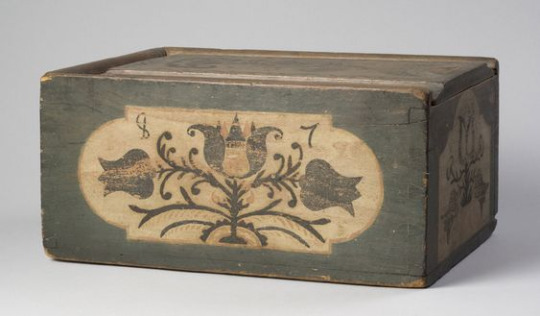
From a 2017 auction catalog, early 19th century:

Also from the Colonial Williamsburg Foundation, dated 1720-1740:

#furniture#historic furniture#blanket chest#georgian furniture#federal furniture#painted furniture#18th century#19th century
7 notes
·
View notes
Note
Hi, Maggie!
I hope this won’t sound too random, but did Ned Kelly (also known as ‘Australia’s Robin Hood’) influence your choice of name for Jack? Or anything about him?
YES. Yes it did. Reckon the Aussies are probably rolling their eyes at that but the grip he and the songs he inspired have on me is ridiculous. I took Jack's name from a lot of places, but Wild Colonial Boy was the most important and might be at least partially inspirée by Ned Kelly.
The themes Ned Kelly represents to Australian culture and history shaped him as I started, while trying to avoid the more mythological aspects. Jack's utter disrespect for people in authority when he feels they didn't earn it comes from that. The fierce sympathy he has for the working classes comes from those themes (admittedly while participating enthusiastically in empire, enjoying his father's status and being a bit of a cab sav socialist.) His rejection of his father's name for the first time in the aftermath of Gallipoli after he had to re-enlist after he was killed at Quinn's Post (chose that particular bit of the anzac frontline because Quinn was Ned Kelly's mother's maiden name lol) with the advent of the Easter uprising.
The split between the concepts of Jack Christian Kirkland and Jack Kelly, even amongst the settler colonists between an Anglo and an Irish concept of Australia had consequences that reverberated across the empire and really across the world. It had it's largest effect on Ireland, New Zealand and Australia, of course. But it contributed to everything from the first full-length film, to anonymous voting to labour unions. Passchendaele, Quebec independence, the re-entrenchment of American isolation after 1918, Women's suffrage as a world wide phenomenon, the fall of Singapore in 1941, the destruction of Dutch hegemony in Indonesia, the Korean and Vietnam Wars were all heavily influenced by this dichotomy.
It's not an exaggeration to say that the entire pacific world of my universe hinges on the relationship between Brighid and Jack who's origin I picked up reading an article about Ned Kelly in 2017.
#the ask box || probis pateo#jack || a land of summer skies#Brighid || An Bearna Bhaoil#Jack and Brighid || bound for Botany Bay
24 notes
·
View notes
Text
Julius Scott’s legendary study tells a captivating story of the unrest of “masterless” communities, as he terms them, in the late eighteenth-century Caribbean and its implications for the Atlantic World. This unrest was undergirded by what he terms a “common wind” of seditious political news circulating through an increasingly mobile and interconnected region. He deftly sets the context [...] to imperial tensions that culminated in uprisings and revolutions within [...] the French, British, and Spanish Empires. [...] He builds what is this field-defining work from a triangulated analysis of three central hubs of the colonial Caribbean in terms of [...] prosperity in the plantation economy, and political importance to these aforementioned empires: Saint-Domingue [Haiti], Jamaica, and Cuba. But he also explores similar occurrences within [...] Martinique and Guadeloupe for the French, Venezuela and Trinidad for the Spanish, and Dominica and Grenada for the British. He also includes [...] the engagement of the newly formed United States in this network, reinforcing the broader Atlantic impact of the common wind’s radical currents.
---
Chapter 1 explores the upheaval afoot in the mid-1700s colonial Caribbean through a closer look at the movements of a range of actors including enslaved runaways, military deserters, contraband smugglers, free people of color, and poor whites hustling in the islands’ urban centers and surrounding countrysides.
A variety of settings - including the fringes of plantations, maroon settlements, town-based markets, taverns, hospitals, barracks, and wharves - might presumably, if read with the archival grain, illuminate the map of state control. Instead, in Scott’s analysis, these represent the contours of the working class’s unlawful movements and ultimately their fraying of the colonial order, anticipating what Stephanie M. H. Camp [...] would aptly name [...] the “rival geography” of slave society.
---
Chapter 2 shows how sailors’ illicit forms of mobility [...] blurred the bounds between land and sea in this narrative of popular dissent. Their movements [...] as social beings and political dissidents bled into and helped sustain similar kinds of illicit commerce and socializing [...]. Chapters 3 and 4 demonstrate how the common wind consistently blew subversive ideas into and around the Caribbean, much to officials’ chagrin. Scott here homes in on the politically volatile era from the late 1770s through the late 1790s, which saw declarations of war, drastic changes in slavery policy [...] and the emergence of U.S., French, and, most significantly, Haitian revolutionary uprising. [...] [E]nslaved communities everywhere in the region followed as intently as they could as the campaign of the enslaved rebels in Saint-Domingue began in 1791. [...] Political news, no matter how hard officials in the colonies and the metropoles tried to block it, spilled into all levels of society [...]. What flowed through all of these channels animated questions about master-slave relations, mercantilist policy, individual rights [...]. Scott carefully traces the influence of the unfolding Haitian Revolution on well-planned but eventually thwarted uprisings of enslaved people in the Venezuelan port city Coro, the Dutch colony of Curaçao, and the parish of Pointe Coupee in then Spanish Louisiana, all in 1795. He also illuminates the multiple instances of inspiration in the 1790s evidenced in enslaved communities throughout the United States [...].
---
Essentially Scott reveals that the Age of Revolutions cannot be understood without comprehending black resistance in times of war and peace. The tale of Phebe, one of many enslaved Jamaican female runaways who became an itinerant higgler hiding in plain sight in urban spaces like Kingston, or the story of the 1790 mutiny of four enslaved sailors who overtook the Saint Kitts sloop the Nancy with respective origins in the Caribbean, West Africa, and the U.S. South, which Scott called a “microcosm” of the Atlantic, are but two of multiple narratives he includes to show that enslaved people [...] actively built and sustained those circuits via their multilingualism, their savvy, and above all their dedication to achieving a state of masterlessness [...].
This could be achieved not just through formal manumission processes, but through running away and re-creating new lives and livelihoods [...]. The [...] knowledge that these dissidents obtained in their labors allowed them to escape to lives not “off the grid,” but rather in the centers of commercial and state activity, ensconced in communities of opposition and poised to obtain news that prepared them well for their next moves in their albeit precarious existence. [...]
Scott complicates earlier framings of the oppositional working class as strictly of European origin [...]; [...] Scott’s unpublished dissertation [...] influenced the interventions made in Linebaugh and Rediker’s The Many-Headed Hydra [...] years later. [...] He centers enslaved people within the revolutionary Atlantic not just as workers [...] but also as strategic thinkers, and he does so long before it was popular to do so in this field of history. [...] [H]e demonstrates how so many ordinary enslaved women and men regularly engaged in quotidian forms of fugitivity across various imperial territories of the Caribbean [...]. The dissertation also came several years in advance of the still pivotal call advanced by Michel-Rolph Trouillot’s 1995 Silencing the Past, about the denied centrality of the Haitian Revolution to the Age of Revolutions in its time and in retrospect. Scott’s work undeniably influenced many Atlantic historians [...]. The Common Wind is not only a historical and historiographical revelation; it is also a genuinely exciting read.
---
All text above by: Natasha Lightfoot. "The Common Wind: A Masterful Study of the Masterless Revolutionary Atlantic". The American Historical Review, Volume 125, Issue 3, pages 926-930. June 2020. [Bold emphasis and some paragraph breaks/contractions added by me. Presented here for commentary, teaching, criticism purposes.]
13 notes
·
View notes
Text
Shir Hever, the military embargo coordinator for the Palestinian BDS National Committee, called India's closeness to Israel during this moment "shameful", given India's long history under colonial rule. "Hermes 900 drones are used to bomb defenceless civilians in the Gaza Strip and the West Bank. As Israel refuses to abide by the ICJ decision to refrain from actions under Article 2 of the Convention to prevent Genocide, third states such as India have the responsibility to enforce an arms embargo and not be complicit in the genocide," Hever added. Hever noted that since the ICJ ruling, two Japanese arms companies have ended their MoUs with Elbit Systems, Israel's largest weapons manufacturer. Meanwhile, on 5 February, a Dutch high court banned the Netherlands from continuing its export of F-35 parts to Israel, given the context in Gaza. "This moment is a test of the international law system, and instead of siding with Israel's genocide and its enabling of western powers, India should take inspiration from South Africa's global-south leadership and end its complicity with genocide," Hever said.
Azad Essa, ‘War on Gaza: Indian-made Israeli 'killer' drones set to make their way to Gaza’, Middle East Eye
6 notes
·
View notes
Photo
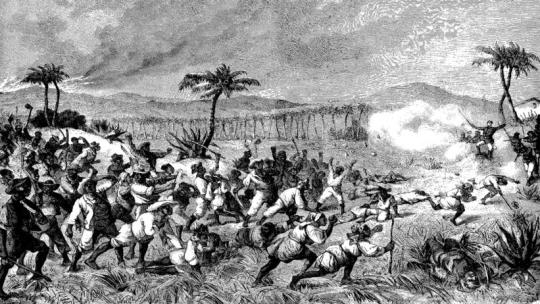
On this day, 1 October 1878, a labor uprising broke out on the island now known as St. Croix. Decades previously, the Dutch occupying government passed the Labor Act of 1849, which replaced a chattel slavery system with a wage slavery arrangement. Workers were only allowed to change employers on one day per year, 1 October, locking them into low pay and poor treatment for the remainder of their time. Those who did not work or violated the terms of the contracts imposed on them were met with heavy fines and punishments. After years of enduring these conditions, organizers led a planned revolt against them on so-called Contract Day in 1878. Key to this organizing were three women, known as the “Queens,” who were leaders in the community of laborers. Their names were Queen Mary, Queen Agnes, and Queen Mathilda. On the day of the planned protest, events became increasingly violent when rumors spread that a farm laborer named Harry Trotman had been beaten by police and died. Although this proved just a rumor, it inspired a collective action against a military base on the island, with laborers pushing soldiers into a retreat behind the walls of a fort. In retaliation, colonial forces committed acts of terrorism against the laborers, burning shops, farms, and buildings across the island, giving the rebellion its name: Fireburn. The aftermath of the uprising was marked by reforms, some more meaningful than others, including a broad wage increase for all laborers on the island. Today, the event remains iconic to the descendants of the rioters as a symbol of collective resistance against colonial exploitation. * If you appreciate our content, please connect with us independently of social media corporations by joining our occasional email list at https://workingclasshistory.com/sign-up/ https://www.facebook.com/workingclasshistory/photos/a.296224173896073/2096723377179468/?type=3
102 notes
·
View notes
Text
Speech by King Willem-Alexander at the commemoration of the role of the Netherlands in the history of slavery, Oosterpark, Amsterdam
01-07-2023
Ladies and gentlemen, here in the Oosterpark, on the Museumplein, in Suriname, in the Caribbean part of our Kingdom, or wherever in the world you are tuning in,
‘Within the city of Amsterdam and its jurisdiction, all men are free, and none are slaves.’
These are the words of a Dutch legal provision from 1644.
We are standing in a city that, for centuries, has prized freedom above all else.
In the capital of a country that, throughout the course of history, has repeatedly battled against tyranny and oppression.
And yet, the principles that were taken for granted within this city and within this country did not apply beyond its borders. Here, slavery was banned. But overseas it was not.
Of all the ways in which a person can be robbed of their freedom, slavery is surely the most painful. The most degrading. The most inhuman.
To view a fellow human being as a commodity, to do with as you please. To use them for profit, as a beast of burden, with no will of their own. To be chained, traded, branded, worked to the bone, punished. Or even killed with impunity.
Recently, the Queen and I have had many conversations with people in the European Netherlands and in the islands of the Caribbean part of the Kingdom. We’ve met people with Surinamese roots, and people with ties to Indonesia. Among them are people who only have to go back three generations to find family members born into slavery.
And they made very clear just how deep the wounds remain.
Thanks to the work of many dedicated researchers, we are learning more and more about the Netherlands’ role in the history of slavery. We know that more than 600,000 people were transported across the Atlantic Ocean from Africa aboard Dutch ships, to be sold as slaves or put to work on plantations. Around 75,000 did not survive the crossing. We also know about the extensive slave trade to the East, in areas controlled by the Dutch East India Company. And we know about the atrocities committed against the indigenous populations of the colonies.
But there is also so much that we don’t know. The archives contain the raw figures. They present the facts with a bookkeeper’s precision. But the voices of the enslaved are lost in the mists of time. Leaving barely a trace behind.
It is awe-inspiring that so many of them found the strength to rise up against their captors, even if it was often an act of simple desperation. From their hideouts in Suriname’s vast forests and swamps, resistance fighters such as Boni, Baron and Joli-Coeur defiantly challenged the inhumanity of slavery. Their heroic deeds, and those of many others, are a testament to a pride and strength that could not be broken.
Very occasionally, we find the voice of a black freedom fighter preserved in the written record. One example is Tula, the leader of the 1795 revolt in Curaçao. Five months ago, the Queen and I stood with our eldest daughter on the site where he lived and worked, the former Knip plantation.
How reasonable and compassionate Tula’s words sound to our modern ears. Invoking the ideals of the French Revolution and the equality of all people, regardless of their skin colour, he said, ‘We do not seek to harm anyone, but want nothing more than our freedom.’
The response from the authorities was brutal and merciless. As punishment, Tula was tortured and then beheaded.
The horrific legacy of slavery remains with us today. Its effects can still be felt in racism in our society.
On 19 December last year, the Dutch prime minister apologised on behalf of the Dutch government for the fact that, for centuries, in the name of the Dutch State, human beings were made into commodities, exploited and abused.
Today I stand before you. Today, as your King and as a member of the government, I make this apology myself. And I feel the weight of the words in my heart and my soul.
But for me, there is another personal dimension.
Slavery and the slave trade are recognised as a crime against humanity. And the Stadholders and Kings of the House of Orange-Nassau did nothing to stop it.
They acted in accordance with laws which at the time were considered acceptable. But the system of slavery illustrated the injustice of those laws.
As the Second World War highlighted more recently, you cannot hide behind laws when your fellow human beings are reduced to animals and subjected to the whims of those in power.
At a certain point you have a moral duty to act. All the more so considering that here, in the European Netherlands, slavery was strictly forbidden. What was thought normal in the colonies overseas – practised on a large-scale and encouraged, in fact – was not allowed here. That is a painful truth.
The independent study I have commissioned will shed more light on the precise role played by the House of Orange-Nassau in our country’s colonial past and the history of slavery. But today, on this day of remembrance, I ask forgiveness for the clear failure to act in the face of this crime against humanity.
I realise only too well that by no means everyone shares the same feelings about this commemoration. And there are people in the Netherlands who feel that apologising now, so long after the abolition of slavery, is going too far. Nevertheless, the vast majority of them do support the fight for equality for all people, regardless of skin colour or cultural background.
I would therefore ask you to open your hearts to all those people who are not here today but who do want to work with you to build a society in which everyone can participate fully. I ask you to respect the differences in people’s experiences, backgrounds and powers of imagination.
During the conversations the Queen and I recently had with the descendants of enslaved people, one said, ‘Let’s not be so anxious. Don’t worry so much about saying the wrong thing’. Someone else said, ‘Let’s embrace our discomfort’.
There’s no blueprint for the process of healing, reconciliation and recovery. Together, we are in uncharted territory. So let’s support and guide each other.
Sixty years ago today, a group of Dutch people of Surinamese origin marched through the centre of Amsterdam waving banners that read ‘Ketie Kotie fri moe de’. They lit the fire of remembrance that we keep alight today.
This is an important day for anyone with ties to Suriname, including those whose forebears travelled to the colony as contract labourers.
I hope that the descendants of enslaved people and of people subjected to forced labour in other parts of the world feel they are part of this gathering. I hope they feel heard. People from the Caribbean part of the Kingdom. And the many Dutch people who have ties to Indonesia, and who carry the pain of great injustice in the past.
We all have our own family history. Our own emotions. Our own cultural traditions that ground us in our communities. Our rituals that comfort us, symbols that encourage us, and words of wisdom that resonate in our hearts.
All those traditions are precious, and they deserve respect. But let us also reach out beyond them to each other. To build a world without racism, discrimination and exploitation.
After acknowledgment and apologies, let us work together to foster healing, reconciliation and recovery. So that we can all be proud of what we share. So that we can say:
Ten kon drai
Times have changed
Den keti koti, brada, sisa
The chains are broken, brother, sister
Ten kon drai
Times have changed
Den keti koti, fu tru!
The chains are broken, it’s true!
14 notes
·
View notes
Text
All right fuck it I'm infodumping about MRNYC under the cut
So I have this world called Magical Realism New York City that I've created wherein most species/creatures from folklore and mythology do in fact exist, with... Nebulous knowledge and understanding of this by humans (meaning some are totally in the dark and some absolutely know about it and are part of it). It is the entire world but my main characters are centred around NYC, hence the name. There are other realms/planes/etc which have some crossover with the "mortal" one, and though gods aren't really a thing as such there are other very powerful beings that exist in those other realms that occasionally do rock up in the mortal world and fuck around to varying degrees. There are vampires, werewolves, angels, demons, magic users, Fae, and most things you can probably think of.
The whole notion actually spawned around the idea of vampires and werewolves. I thought the idea of the garlic thing being BS but widely believed means that an Italian restaurant would be the perfect cover for a vampire family. They have a long standing partnership with the werewolf pack that runs the meatpacking district both for actual meat products (it is a restaurant after all) and for the blood that would otherwise be disposed of, so they don't have to worry about their supply or anyone going off the shits. In MRNYC, there's one main vampire colony and one main werewolf pack, though there are smaller packs in each of the five boroughs and a collection of werejaguars on Long Island. The colony is mostly one big Italian family, and the Wolfpack is one big Dutch family, and they've both been here for centuries at this point. The werewolves also do a lot of community work, they're very social, they hold block parties and stuff. The vampires are less so, but they do keep in touch. One of the werewolf great-grandchildren and one of the vampire grandkids are dating, their names are Katherine and Catarina respectively, they are very cute and their families are very happy for them. (There are a number of vampire subspecies as well as numerous types of weres, but the following rules apply to basically everyone). Both communities are remarkably self-policing; it takes months of preparation and understanding of the community, the change, and the consequences before someone is allowed to become either. This is not something to go into unprepared, and consent is incredibly important. (I did take some inspiration here from the Jewish conversion system e.g. it's not active and in order to do so you gotta COMMIT and DO YOUT RESEARCH before you're granted the opportunity.) If a bite/transformation happens by accident/maliciously, that is one of the only circumstances where seeking treatment would be considered, and if someone decided they didn't want to the community would welcome and educate them, helping them however they could. Whoever did the unconsensual transforming though... Would not be so lucky. That's a serious transgression and would be treated as such. The Manhattan pack and colony are not the only wolves and vamps on the island, just the largest collections, and they do outreach to new arrivals and have connections with other packs/colonies. There are plenty of small packs, and of course New York has universities where you'll get young members of social species away from their families for the first time, so there's a lot of outreach and connection to provide a safety net for people who need it.
Angels and demons do exist, from their respective (linked) realms, but they don't have the inherent attributes given to them by superstitious/religious humans, they're just people. They (along with most species) can interbreed with humans, although instead of creating a super powerful nightmare child they just... Have a nephil or cambion kid. Who has some of the abilities of their supernatural parent, but probably not all of them. The vast majority of those who interact with humans are "lesser" demons or angels, the Just Some Dudes of their respective realms, and it's not particularly common for "greater" ones to show up. They're in charge, they have shit to do.
While "sorcerer" is a general description that can be applied to magic users of any species, witch and warlock are actually their own species, not the same but closely related (think like Vulcans and Romulans, for example). Both are longer-lived than humans (averaging a couple centuries) and have inherent magic which presents in small ways, like oddly coloured eyes or faint patterns on the skin. Warlock blood is faintly silvery and inherently toxic, they can't be changed into vampires or werewolves, and if their blood gets on human skin it will leave a chemical burn. Witch blood isn't toxic, and they can be transformed. If you meet a magical wolf or vamp, they likely either have witch parentage or were one first.
The Fae exist. They have their own realm, but some places in the mortal world have entrances to it. The Fae have a particular attachment to Ireland (with some of Scotland and Wales as well) and are very protective of it, meaning that the vast majority of non-human activity there is either the Fae or requires their blessing. They can be particularly vindictive if they feel that their permission has not been properly asked or that someone is trespassing on their protected ground. This can lead to some... Less than favourable situations for non-fae supernatural families, unfortunately, and can be a reason people end up leaving the Isles.
There are two major protective organisations that deal with various issues and threats, as well as things that may cause problems between realms. These are the Wardens, who deal with the living, and the Reapers, who deal with the dead. Both are joinable by anyone, and are very good employers. Wardens are somewhere between Witchers, border patrol, and bounty hunters, investigating/finding/returning extradimensional creatures from whence they came and dealing with unexpected incursions. Listen, not everyone is nice. Reapers, meanwhile, deal with the dead or those manipulating the dead, as well as guiding wayward spirits home. If there's a haunting, things coming out of graves, anything of that nature, that's a Reaper's job to deal with. All Reapers are dead themselves; if someone feels like they're not done but in a... Non-haunting way, they can become a Reaper. There's a training process as well as some physical and spiritual reinforcing, but it's also a job so you get days off and holiday and all that. Death is a very fair employer. There's also the Guardian of the Veil, who isn't any of these, but whose job it is to essentially watch borders between worlds and deal with anything that is a Massive Fucking Problem, and they have leave to call in as many Wardens or Reapers (or both) as necessary. If the Guardian calls, whatever you're working on can wait because this is an Imminent Threat To Global Existence and you are needed now.
Okay that's all the worldbuilding I can really think of at the moment! My wonderful partner @themechanicsnightmare has helped me flesh out this marvelous world with significant contributions (the Reapers and the Guardian were their ideas, plus witches being a species as well as warlocks), it wouldn't be the lived-in world it has become without them. If the worldbuilding here interests you and/or you want to know about the main characters in the world, let me know!
And before anyone asks: no, there is no webcomic or novel or anything for this, and no there is not going to be one. While things like the Wardens and the specific ways the species work are my invention, urban fantasy/magical realism is a broad genre for a reason. I took inspiration from Grimm, Supernatural, Percy Jackson/the Riordanverse, and The Mortal Instruments (albeit mainly the bits I liked or wanted to fix) as well as many, many pieces of mythology and folklore. This is just my iterations of it. The characters are very much mine, and the specifics of the world are mine, but urban fantasy is a wonderful base for a worldbuilding concept and I highly encourage people to use it.
14 notes
·
View notes